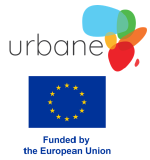Mamadou Diagne's farm
Agroecology, diversity of crops, animal production, compost, intercropping
Mamadou Diagne
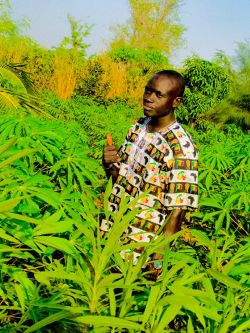
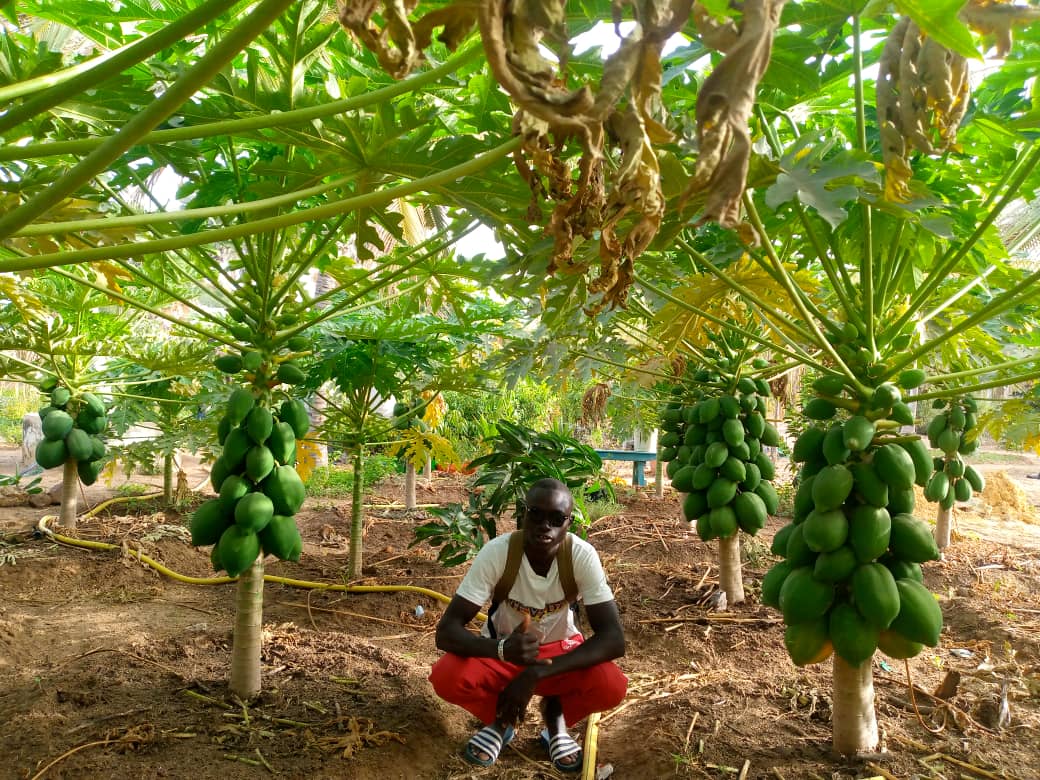
Mamadou Diagne, a farmer in M'bou, Senegal, cultivates his lands according to the principles of agroecology. Here is a portrait of his farm.
Context
- Name: Mamadou Diagne.
- Location: M'bour, Senegal.
- Farm name: Kaydara Farm School.
- Establishment date: 2017.
- Cultivated area: 1 hectare.
- Soil type: Sandy soil.
- Number of people working on the farm: 1.
- Productions: Market gardening, mango, coconut, lemon, orange, soursop, guava, cinnamon apple, pomegranate, cassava, papaya, cows.
- Climate: Variable depending on the year. Significant wind.
- Education/Training/Life Path: Attended a normal school until the 9th grade. His siblings are in university, but he felt that formal education was not suitable for him. He wanted to pursue training in agroecology, but his father disagreed because he has been a farmer for a long time and didn't believe it would work. Mamadou wanted to change and practice a different type of agriculture through agroecology. He met Gora Ndiaye, the director of the Kaydara Agroecology School and underwent training in 2015-2016. His mother had a vegetable garden, so he found joy and love for market gardening.
- Challenges faced: Dead soil and significant wind.
Motivations and objectives
- Demonstrate to the village that agroecology works and that one can succeed and achieve self-sufficiency on these lands.
- Families here often have large hectares (50-60 ha) and only cultivate during winter. In fact, people come from everywhere to work during the rainy season. The goal is to be able to farm all year round. He knows that for this, the land needs care and nourishment to thrive.
- Become an ambassador and share the knowledge.
- Earn a decent and honest living and live with one's family thanks to their production.
Agronomic aspect
Plant productions
- Diversity of vegetable crops: This year (2023), only onions, but in other years, a variety of crops are grown.
- Diversity of fruit trees: 37 mango trees, 20 coconut palms, citrus: 5 lemon trees, 2 orange trees, 2 soursop trees, 2 guava trees, 2 cinnamon apple trees, 2 pomegranate trees, cassava, and papaya.
- Seeds: Seeds are received from the Kaydara School. It is challenging to buy seeds everywhere because they are not always organic. Kaydara School has a seed bank and provides seeds. Vegetable seedlings are homegrown. A portion is reserved for reproduction to achieve self-sufficiency in seeds."
Photos gallery
Animal productions
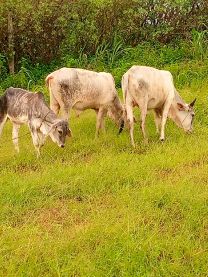
He raises a few fattening cattle for 3 months each year. He buys them at 4-5 years old, lean, then feeds them with hay and food and sells them. He raises about 10 per year. He buys them for 300,000 CFA each and invests 50,000 CFA for fattening. They are sold for 600,000 CFA each.
Agricultural practices
- Soil fertility management: Compost is the priority. The manure is composted for about 15 days for 5 kg. The dosage is done according to the plant's needs and the appearance of deficiencies. These needs are not measured but can be observed with the naked eye. For example, if the plant is yellow, it lacks nitrogen. The amount of compost per tree is 5 kg, and it is continuously applied.
The manure for compost comes from the village and family animals. A total of 12 tons of manure equivalent to 120 carts of 100 kg/year are used.
- Pest management: No quantification of losses due to pests. He considers it normal to have losses. He follows the law of nature, allowing insects and pests to have their share. Nature belongs to everyone. Initially, squirrels used to eat all the cassava. Some colleagues advised him to use products to kill the squirrels, but Mamadou refused. They eat less now, and over time, they stop. He develops alternative techniques like intercropping. Thus, plants drive away insects through scent, and flowers attract insects elsewhere. He has no issues with pests currently. Treatments are natural using solutions of garlic, tobacco, and neem. Everything is plant-based. Treatments are done every 10 days preventively.
- Soil preparation: Preparation is done 15 days before planting. The plot is marked and protected by windbreaks made of coconut or rônier leaves, for example, with a maximum height of 1.5m. The work is done in small rounds or according to the specific crop. Planks are set up with manure at the bottom, followed by 10 days of watering before sowing or planting.
Water System
- Source, volume, and flow rate: 3 m3 and approximately 1.5 m3/h.
- Irrigation method: Well with diesel and electric motor pump.
- Watering frequency: Daily. Land divided into 2 parts, one watered in the morning, the other in the evening. 20-40 L/day/plant.
- Economic: 5. Mamadou is not extremely satisfied, but he manages to meet his needs. Money comes in gradually.
- Working comfort: 1. The work is very hard.
- Social: 10. Content.
- Living environment: 9. He likes the environment, the diversity, the birds, etc.
- Scale from 1 = very dissatisfied to 10 = very satisfied.
Environment
- Technical support/aid: Often, people with specific knowledge about practices come to see the farm. There was a partnership with Kaydara for 5 years. Gora Ndiaye occasionally visits to provide advice on practices.
- Cooperation with other farmers: 10. Excellent cooperation.
Economic Aspect
Land
- Guaranteed access to the land provided to Mamadou. The land is valued at 4 million CFA/ha.
- He built a building for 300,000 CFA.
- The house is more expensive but was provided by partners.
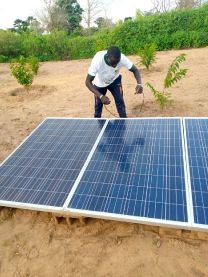
Equipment
- At the beginning, he had 0 CFA in his pocket and no means. Then he bought a pulley right from the start.
- After 1 year, he bought a pump with the proceeds from the sales of cassava, etc. This motor pump cost 85,000 CFA, with an unknown capacity in m3/h and running on diesel.
- After 6 months, he stopped using the motor pump and invested in solar power for 400,000 CFA. He kept the other one in case there was not enough sunlight or it malfunctioned.
Donations, Financial Assistance
He received assistance from the Kaydara Farm School in the form of plant capital, all tree seedlings, help with harvesting, and assistance for the well. He also receives support and follow-up assistance from the Kaydara Farm School. He received assistance from the Eau-vive association with the donation of the well valued at 1 million CFA. Tree seedlings were given by the Kaydara School, totaling approximately 2 million CFA in value.
Expenses
- Purchase of cattle and feeding: 350,000 CFA (300,000 CFA for the cattle and 50,000 CFA for feed).
- No electricity or water charges. Just need about 20 L/year of petrol for the pump.
- Seeds are exchanged with the Kaydara School, so no costs.
- He brings in motorcycles for shopping once a week for 6 months, costing around 1,000 CFA/ride, totaling about 25,000 CFA/year.
- Manure is free as it comes from family and his cattle.
Products
- The cattle, after fattening, are sold for 600,000 CFA each, bringing in 250,000 CFA per cattle. He raises about 10 per year.
- For vegetables (cassava + vegetables), he sells for 1.5 million CFA, with half of the cassava being sold.
- For coconuts and mangoes, he hasn't had any production yet.
- For papayas, he produces 1.5 tons/year and sells them for 750 CFA/kg.
- For lemons, he sells for 30,000 CFA/tree (first year of production), totaling 150,000 CFA with his 5 trees.
- For oranges, it's only for personal consumption; in the future, he hopes to have 100 kg/tree (2 orange trees) and sell them for 1,000 CFA/kg.
In addition, he works in orchards for other farmers and has orchard maintenance contracts. He maintains the orchards of friends (4-5 orchards) about every 15 days at 30,000 CFA/month per orchard. Maximum 1 hour of work per orchard, 2 times/month, and well-paid. He has stopped selling plants. Approximately 6.5 million CFA/year in revenue (estimated income: 6.1 million CFA/year = 9,000€/year) (average annual salary in Senegal = 858,845 CFA).
Business strategy/Outlets
- Market gardening was started to be self-sufficient and generate quick income.
- Radishes, beets, etc. are cultivated for self-sufficiency, and the surplus is sold to hotels. 100% of the sales are to hotels; he cannot meet the entire demand.
Advice from the farmer
- Advice on agroecological practices:
- Take time to reactivate microbial life. First, plant fertility plants, then add compost and water to reactivate life.
- Install barriers to slow down the wind and plant vetivers to stabilize the soil.
- Divide the land into boxes to start and store plant assets near the well.
- Once the holes are made, put manure at the bottom, water it and wait for life to activate, then plant coconut palms and mango trees in interlines.
After 2-3 years, a beautiful landscape can already be achieved.
- Advice for the economic model: Don't spend a lot and save money. Always amortize the tools and watch expenses.
Future prospects
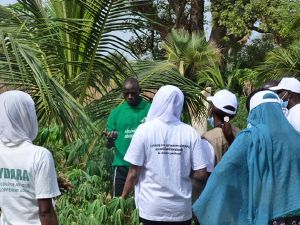
- Expand and broaden the model to train other young people in the village.
- Create a farm similar to that of Kaydara.
- Establish partnerships with other organizations.
Sources
Interview with Mamadou Diagne conducted in February 2023 by the team of Ver de Terre Production as part of the Urbane project. Photo credits: Mamadou Diagne.
This page was written in partnership with the Urbane project and with the financial support of the European Union.











